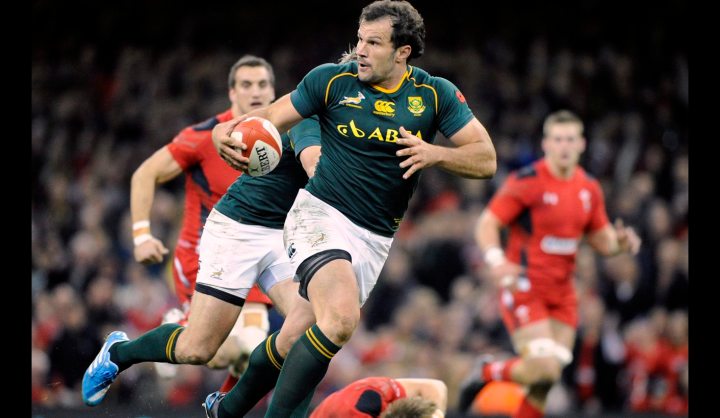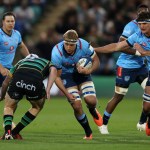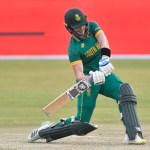Sport
Save the Wales: Boks harpoon the Red Dragons

The Springboks said they would do their talking on the field and they proved their point to Wales as they beat them 24-15 in Cardiff, scoring three tries to nil, to maintain their historical dominance over the Red Dragons. By KEN BORLAND.
That the Springboks scored three tries despite only having 47% of possession and 48% of territory shows how clinical they were, and two of their tries were amongst the best they have scored this year.
The fact that Wales could only garner five penalties through sharpshooting fullback Leigh Halfpenny shows how limited they were on attack and how unforgiving the Springboks’ brick wall of defence was.
That the Springboks only managed a nine-point winning margin points to perhaps the greatest influence on the match: referee Alain Rolland, much to the chagrin of those who wanted to watch what could have been a spectacular game of rugby but instead were treated to a symphony of whistle-blowing by an official who clearly wanted to take centre-stage.
The Springboks – apart from the short period between the 12th and 17th minutes when Jean de Villiers and Bismarck du Plessis scored – struggled to maintain momentum despite dominating the collisions. That was because Rolland was over-zealous with his whistle, baffling both teams at the breakdown as he awarded 26 penalties, 15 against South Africa, which is the most they have conceded this year.
When the Irishman of French descent was appointed to the fixture, there seemed little to worry about because Rolland had refereed the Springboks on numerous occasions – a record 16 times in fact – and had usually done a good job, the South Africans winning nine of those Tests, including the 2007 World Cup final against England.
But Rolland’s failure to insist on the tackler or assistant tackler “providing light” between themselves and the ball-carrier was infuriating and his performance reached farcical levels when he decided to yellow card both Gethin Jenkins and Coenie Oosthuizen, who had just appeared for his first scrum, for that set-piece repeatedly collapsing.
How an experienced official failed to notice how hard a shocking playing surface made it for the front-rankers to keep their feet was bemusing and, when neither side is obviously at fault, a referee should just re-set the scrum instead of desperately looking for someone to penalise and ending up guessing. Uncontested scrums were the unsavoury consequence of the yellow cards.
South Africa’s momentum was also hampered by a yellow card to flank Francois Louw late in the first half, which was a harsh call for him. But it was at least a penalty when the Springboks were hard on attack and Louw thrust his elbow into hooker Richard Hibbard’s neck; a disappointing moment of ill-discipline from him.
Wales started the match strongly with powerful centre Jonathan Davies twice scything through their defences, leading to penalties by Halfpenny. The Springboks were glad to see the back of him after 12 minutes, as he left the field with a shoulder injury and deprived Wales of what turned out to be their only attacking threat, as the hosts largely ignored using giant winger George North.
Davies was injured in the build-up to South Africa’s first try, a dazzling effort that began 30 metres inside their own half. Morne Steyn decided to use his backline rather than kick and Bryan Habana spotted a mismatch against Hibbard, backed himself and raced clear upfield. Du Plessis produced a great supporting run, bashing through Welsh wing Liam Williams, before an excellent pass to De Villiers allowed him to add the finishing touches.
Five minutes later, in what was a portent of what would be one of the Springboks’ great strengths, Wales lock Bradley Davies was stopped in his tracks by Willem Alberts, driven backwards, and the home side were forced to concede a penalty at the ruck. It was kicked to touch and the rolling maul was set, leading to another penalty, which was again used to set the lineout and a rolling maul.
Even though the front of the maul was sacked, the back half remained and featured the imposing Du Plessis, who swivelled over to score.
Throughout the game, Wales struggled to know what to do to halt the Springboks’ rolling maul and it was a key weapon for them, as was their superiority in the lineout.
What was shaping as a Welsh strength was neutralised in the 31st minute as veteran tighthead prop Adam Jones went off and made the scrum a lot more comfortable for the Springboks, allowing Frans Malherbe to settle in what was a solid debut for him.
Captain De Villiers spoke after the match of not being very satisfied with the performance and what probably bothered him most were the second and third quarters when the Springboks allowed themselves to be sucked into the Welsh style of play and became too loose.
When they reverted to keeping pressure on the hosts with their kicking game, they regained control, and scrumhalf Fourie du Preez was instrumental in their tactical improvement in what was a strong game for him.
The Japanese-based veteran also started and finished the try to finally kill off Wales, stretching the Springboks’ lead to 24-15 with 15 minutes remaining.
Du Preez kicked turnover ball down the left touchline to exploit the acres of space down there and Wales were slow to get across, allowing Jaque Fourie to nip through and gather the ball, producing a brilliant pop-pass inside in a split-second to the scrumhalf, who cantered over for the try.
But Rolland’s failure to note than Fourie was in front of Du Preez’s kick and never retired only added to the sense of frustration over the officiating.
To hear the TMO trying to coerce Rolland into looking at replays for foul play when a crucial try went unexamined was equally exasperating.
But in the end it would have been foolhardy to deny South Africa were worthy winners. Wales failed to handle the immense physicality of Alberts, Duane Vermeulen, locks Etzebeth and Van der Merwe and hooker Du Plessis, while the Springboks were far more clinical on attack, thanks to the decision-making of Du Preez and the sheer class and undiminished speed of Habana. DM
Photo: South Africa’s Bismarck Du Plessis breaks through the Welsh defence before scoring a try during the international rugby union match at the Millennium Stadium in Cardiff, November 9, 2013. REUTERS/Rebecca Naden



















 Become an Insider
Become an Insider